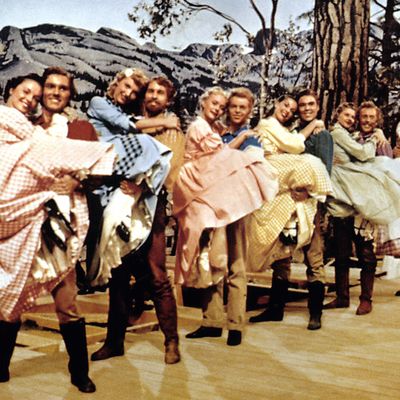
Keeping up to date with research findings in the world of gender and sexuality is a depressing task. The steady onslaught of studies that state the evolutionary reasons for mean girls or find that women don’t mind being objectified mostly seem to rationalize the status quo — bad news, in other words, for the woman who aspires to a better sex life than her cavewomen ancestors. Terri Conley’s Stigmatized Sexualities Lab has been producing research that’s the rare, refreshing exception. A University of Michigan professor of psychology and women’s studies, she’s systematically debunking the conventional wisdom surrounding gender, sexuality, orgasm, and desire.
Take the famous 1989 casual sex study, in which Russell Clark and Elaine Hatfield found that 70 percent of men will agree to have sex with a stranger when propositioned, compared to 0 percent of women. Their findings — appearing to bolster stereotypes about men’s and women’s differing sexual desires — have become gospel for people who write about the so-called hookup culture. In a series of papers published in 2011 and 2012, Conley’s lab put forth an alternative explanation: Women were passing on sexual advances out of fear of being judged as promiscuous and doubt that a one-night stand with a new partner would be pleasurable. When her researchers controlled for these factors, the casual-sex gender difference evaporated.
“I like to look beyond conducting research that confirms existing stereotypes,” Conley told the Cut over the phone last week. “These gender differences that everyone knows exist, and they know they’ll always exist and they’re biological — when I started pressing on them I found that a lot of those assumptions hadn’t really been tested.”
The Cut: It’s gratifying to read research about casual sex where women are presented as rational operators, and not just evolutionary victims. Did you explicitly set out to debunk Clark and Hatfield?
Conley: I didn’t intend to debunk it, but the evolutionary explanations for it seemed, at best, incomplete to me. I went into the research thinking their results would be robust and replicable. But as soon as we started asking people about their actual experiences — “What did you say the last time someone asked to have sex with you?” — the differences were a lot smaller. Close to half of the time, women are saying yes to these experiences. We have a paper under review that says there are no differences between men and women if you control for two factors: pleasure, which we define as how capable they perceive their partner to be, and stigma, which we define as someone believing you’re a bad person for engaging in casual sex. I like to think of my research as trying to rule out alternative explanations in a way that evolutionary psychology doesn’t bother to do.
Is research that reinforces long-held assumptions about gender bad for women?
A lot of these things contribute further to stigma surrounding sexuality. The fact that the stigma exists is not new, but the fact that it is actually a motivating factor for women — one of the reasons that women are choosing not to engage in casual sex — is. So whenever I get to talk to guy outlets I like to emphasize: The reason women are turning you down for casual sex seems to be that, for one thing, a lot of you are calling them sluts afterward. A lot of you aren’t bothering to try to be good in bed. Until you can try to get that under control, it’s kind of hard to take seriously all these complaints about not having access to casual sex. It’s largely a product of your own behaviors.
I almost think the gender stereotypes reinforced by evolutionary psychology are more damaging to men in some ways. The message is that men can’t control themselves, that men shouldn’t be expected to view women as humans because of these ancient evolutionary forces. But more importantly, I think it’s bad for science, because they’re operating on untested assumptions. Those are the foundations of the theory.
Your “pleasure theory” for gender differences in casual sex seems to be catching on. There was a New York Times article about less-than-satisfying hookups recently, and I read that you’re looking further into the orgasm gap as well.
We haven’t gotten a stable data set because, for the most part, men don’t define something as sex unless they have an orgasm. So all this stuff about how women are less likely have to an orgasm than men, it has to be in large part that men just say, Oh, I didn’t have sex, if they didn’t have an orgasm. Researching it has been a real trial. We have this not-very-romantic language in our new study, along the lines of, Anything where you touched someone’s genitals or they touched yours. And we still have people write in the notes, Well, I put it in but I didn’t come. They define that as not having sex. Everyone assumed that difference is really large but I think it might be partly a definitional issue.
I keep telling my lab, I’m so done with casual sex.
Right. You’ve moved on to consensual non-monogamy.
We found that people who are in consensual non-monogamous relationships use condoms more and use condoms more correctly than people who are secretly cheating on their partner. It seems to speak to a general tendency to be more knowledgeable. Probably more important is a review paper I have coming out, covering the question “Do we know for sure that monogamy is best?” Because everyone assumes that it is. I was actually shocked as I went through it — how little evidence there is to support this. I would talk to journal editors about this, and they’d say, Everyone knows that non-monogamy doesn’t work, we did a lot of research on that before. Okay, so, where is that research? I can’t find it.
We also have a paper about stigma surrounding consensual non-monogamy, which came about because I had reviewers tell me that it’s monogamy that’s stigmatized, not consensual non-monogamy. They said, Well, in Hollywood non-monogamy is all people do, so it’s monogamy that’s stigmatized. So we did a study just to show that overwhelmingly monogamy is viewed more positively than any form of consensual non-monogamy. I always think that’s such a crazy situation, when the dominant group actually thinks it’s being persecuted.
Does organizing your academic career around sex, and on top of that, challenging conventional wisdom about sex, present any unique challenges?
It’s hard to do things that go against the grain. People like to have their stereotypes confirmed, that makes people feel safe and like the world is working properly. In terms of my academic career, I have to do a lot more. Sometimes people ask, Why do you do so many studies in one paper? It’s not because I want to. It’s not because I’m an overachiever. If you’re debunking stereotypes you have to twice as much.
The other thing is that when you’re studying sexuality it’s really hard to be taken seriously. My students will have tenured faculty members asking them, Oh, your dissertation is in non-monogamy, are you polyamorous? It’s not like people who study coping mechanisms for cancer are asked, Oh, do you have cancer?
What drew you to gender and sexuality as an area of research?
I think having a closeted lesbian mom growing up in small town Indiana must have had something to do it! I was sort of on the periphery of knowing or not knowing about her sexual orientation, but it started getting me thinking about homophobic slurs, for example, and when people are having sex and why and what choosing not to have sex means, as well as the closeting process.
Being willing to think about things from a non-dominant perspective is a legacy of my association with women’s studies. I was lying awake in bed a few weeks ago thinking about why my papers get rejected more than most people’s and it occurred to me that every single paper I wrote has someone it’s trying to take down or someone I’m mad at. I have sort of an adversarial approach to science, which I actually think is very healthy for science.




